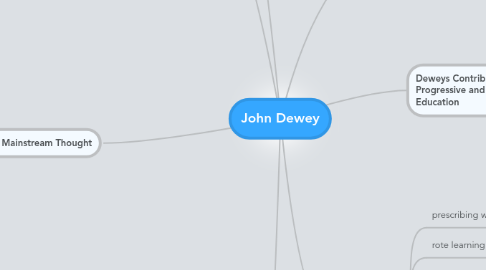
1. Deweys Ideals for Education
1.1. to create a democratic society
1.2. how to live
1.3. create
1.3.1. independent thinkers
1.3.2. self critical
1.4. letting the person discover themselves
1.5. realisation to use one's full potential
1.5.1. for greater good vs competing individuals
1.6. related to outside life
1.7. ideal building
1.7.1. kitchen, workshops, downstair
1.7.2. labortories, museums, music rooms upstairs
1.7.3. thus enabling the child to explore practical problems previously encountered in theoretical ways
1.8. Allows Development of Natural Instincts
1.9. Good Aims
1.9.1. an outgrowth of existing conditions
1.9.2. consideration of what is already going on
1.9.3. consideration of resources and difficulties of a situation
2. Why they challenge Mainstream Thought
2.1. mainstream thought
2.1.1. to acquire predefined set of skills or knowledge
2.1.2. beats out the childs natural instincts
2.1.2.1. free
2.1.2.2. independent
2.1.2.3. creative
2.1.3. become obedient
2.1.4. 'wastes human life'
2.1.4.1. due to isolation
2.1.5. oriented to produce engenieer
2.1.5.1. disagrees that would be a waste of money to create free people
2.1.6. merge into the machine
2.1.7. goal orientated
2.1.8. specified according to coorporations
2.1.9. Bad Aims
2.1.9.1. education and moral ends
2.1.9.2. assume ends lying outside of activities
2.1.9.3. ends are foreign to the concrete make up of the situation
2.1.9.4. ends which issue from an outside source
2.1.9.5. limit intelligence
2.1.9.6. not expression of
2.1.9.6.1. mind in foresight
2.1.9.6.2. observation
2.1.9.6.3. choice of better amongst alternative possibilites
2.1.10. Indoctrination of the young
2.1.10.1. trains
2.1.10.1.1. obedience
2.1.10.1.2. conformity
2.1.10.1.3. passivity
2.1.10.1.4. unquestioning
2.1.11. Stupidity
2.1.11.1. stupid assignments
2.1.11.1.1. technique for selections of obedience
2.1.11.1.2. people who don't obey rejected
2.1.11.2. Doesn't allow progress
2.1.11.2.1. need creativity
2.1.11.2.2. innovation
2.1.11.2.3. independence
2.1.11.2.4. i.e. Japan low scientists but very obedient
3. Aims and Purposes of this Type of Society
3.1. Social Change
3.1.1. through improving each individual
3.1.2. behaviours being adjusted on the basis of social conciousness
3.2. To live in a real democracy
3.2.1. Choices that are democratically created
4. Conclusion
4.1. US not founded to be a democracy
4.1.1. Polyharchy
4.1.1.1. elite lead decisions
4.2. Deweys education system would not sustain this
4.2.1. people would become
4.2.1.1. active
4.2.1.2. involved
4.2.1.3. engaged
4.2.1.4. try to create truly functioning society
4.2.1.4.1. industrial democracy
5. Introduction
5.1. Key figure
5.1.1. Progressive Education
5.1.2. Democratic Education
5.2. Radical at the Time
6. Deweys Contribution to Progressive and Democractic Education
6.1. change happens through education
6.2. runs counter to elite polyharchy found in US
6.3. 'Education is literally and all the time its own reward' p230
6.4. 'Education as such has no aims. Aims arise from children, parents, teacher and administrators; to derive them from the abstract concept to dehumanise education and to expose it to all the errors which Dewey criticises in the traditional schools' p230
6.5. Progressive Movement
6.5.1. Dewey taken on as a theorist
6.6. Opposed to 'No Child Left Behind' 2001
6.6.1. believing setting high standards and establishing measurable goals can improve individual outcomes in education.
7. Society
7.1. prescribing what needs to be learned
7.2. rote learning system
7.3. 1870 just after revolution
7.3.1. established free elementary schools
7.3.2. responsibility of the state to give everyone an eduction
7.3.3. skills oriented
7.3.3.1. transferable between firms
7.3.3.1.1. as a pose to specific skills like butchering a cow
7.3.3.2. geographical areas
7.3.3.3. not developing
7.3.3.3.1. self esteem
7.3.3.3.2. imagination
